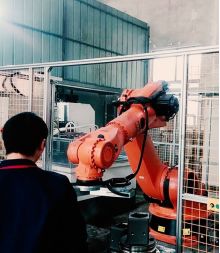Industrial robots are mainly used in the field of industrial automation, and are widely used in automobile and parts manufacturing, motorcycles, engineering machinery and other industries. In the field of intelligent DSP-powered induction heating applications, it can realize the application of the workshop Internet of Things, MES order management, and automatic production lines.

Advantages:
1)The robot can work in a relatively harsh working environment and can continue to operate. In addition, working conditions for workers have improved. After working with robots, the work intensity of workers is greatly reduced, and the actual production capacity of the production line is greatly improved.
2)Stable product quality, automatic loading and unloading, order management and production efficiency
3)After using the robot, the product quality is stable and reliable, which facilitates technicians to understand the actual production situation in the field, control product quality, reduce dimensional deviation caused by human operation errors, and provide strong traceability
4)Adopt the second-generation DSP intelligent induction heating equipment, equipped with code scanning equipment, can realize the automatic production line control system, switch the product information program according to the product serial number, process, realize real-time recording, collection, traceability and management
5)Real-time acquisition and monitoring of intelligent DSP induction heating operation status and voltage, current, power, frequency and other parameters. At the same time, these states can be directly connected to the centralized control network power supply through the communication interface, and the required parameters can be transmitted to other controllers, such as industrial personal computers, CNC systems, notebook computers, remote control centers, etc. to meet the requirements of the Internet of Things in the workshop.
6)The DSP intelligent induction heating equipment control system can seamlessly connect with customers' ERP and MES systems, receive planned orders, and automatically arrange production according to inventory conditions and material model rates (arrange the most appropriate order production orders and batches) to control Equipment for unmanned production